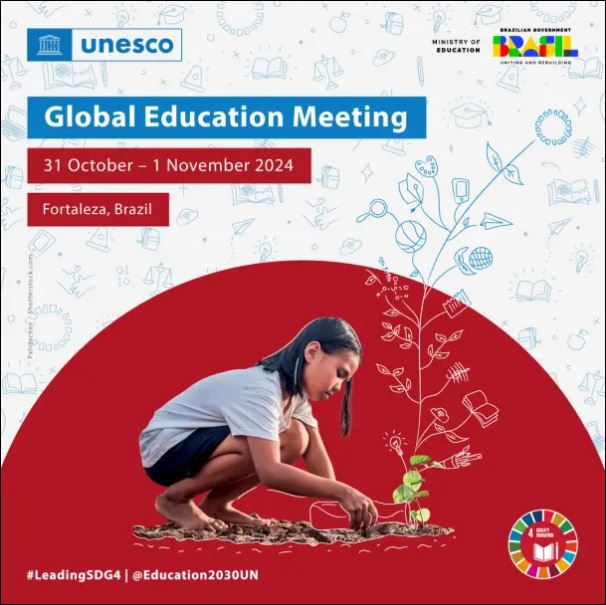العودة

The Global Education Meeting 2024 – a milestone for achieving SDG 4
اليونسكو
2024 - 10 - 21
The 2024 Global Education Meeting (GEM) in Fortaleza, Brazil from 31 October to 1 November 2024, represents a pivotal step toward accelerating global progress on Sustainable Development Goal 4 (SDG 4)—ensuring inclusive, equitable, and quality education for all by 2030. As the world confronts complex challenges, from the lingering effects of the COVID-19 pandemic to political instability and climate change, the GEM provides an essential platform for international cooperation and policy alignment on education.

The 2024 Global Education Meeting (GEM) in Fortaleza, Brazil from 31 October to 1 November 2024, represents a pivotal step toward accelerating global progress on Sustainable Development Goal 4 (SDG 4)—ensuring inclusive, equitable, and quality education for all by 2030. As the world confronts complex challenges, from the lingering effects of the COVID-19 pandemic to political instability and climate change, the GEM provides an essential platform for international cooperation and policy alignment on education.
Why the GEM Matters?
Informed by the United Nations Pact for the Future, the GEM serves as a venue for stakeholders—government officials, international organizations, civil society, and education experts—to collaborate on strategies that address systemic challenges in education. Its outcomes are essential for shaping education policy, mobilizing resources, and fostering partnerships that ensure all learners, especially the most marginalized, have access to quality education.
In 2024, the meeting takes on added significance as it marks the midpoint to 2030, a critical juncture for reviewing progress and addressing gaps in the implementation of SDG 4. It is also closely linked to the broader global education agenda, contributing directly to UNESCO's efforts to build inclusive, resilient education systems, particularly in crisis-affected areas.
Key Contributions to SDG 4
The 2024 GEM discussions focused on priority areas such as enhancing educational equity, improving access to quality learning resources, and integrating technology into education systems. Stakeholders emphasized the importance of inclusive policies that cater to the needs of marginalized groups, including girls, refugees, and children with disabilities. Additionally, the meeting explored innovative financing mechanisms and collaborative partnerships to address the funding gaps hindering progress toward SDG 4. Highlighting these pivotal themes, the GEM sought to inspire collective action and commitment to transforming education for all learners.
Building Momentum for 2030
With only six years left to achieve SDG 4, the Fortaleza GEM is an opportunity to accelerate progress and scale up global action. Collaboration among governments, international bodies, and civil society reinforces the need for bold commitments and immediate action to address the urgent challenges facing education systems worldwide. The results of the GEM will contribute to the upcoming high-level global meetings, ensuring that education remains a top priority in the broader Sustainable Development Agenda. Following the GEM, the outcomes will also lay the groundwork for the Fourth International Conference on Financing for Development and the World Social Summit in 2025.
The Arab States have an indispensable role to play in the global education agenda, and the 2024 Global Education Meeting (GEM) offers a unique opportunity for the region to address its specific educational challenges. From climate education and digital transformation to peacebuilding and equitable financing, the Arab region’s priorities must be integrated into the broader global education strategies. Contributing to the Fortaleza Declaration, would help the Arab States ensure that their perspectives and needs are fully represented, driving progress toward SDG 4 and ensuring that all learners in the region, particularly the most vulnerable, have access to quality, inclusive education.
To learn more about the results of the Arab States' consultation on the 2024 Global Education Meeting and to review the outcome document, click here.
أحدث المنشورات
القائمة الكاملةاليونسكو
المستقبل على المحك: لماذا الاستثمار في التعليم أمر بالغ الأهمية؟
يسلط هذا التقرير، الذي أعدّته اللجنة التوجيهية الرفيعة المستوى المعنية بالهدف الرابع من أهداف التنمية المستدامة (SDG4) بالتعاون مع الشراكة العالمية من أجل التعليم (GPE) ونُشر في عام 2024، الضوء على الحاجة المُلِحّة لتعزيز الاستثمار في التعليم كوسيلة أساسية لمواجهة التحديات العالمية، بما في ذلك تغيّر المناخ، والتطورات التكنولوجية، والتحوّلات الديموغرافية.
اليونسكو
المدن العربية تتألق في جوائز مدن التعلم لليونسكو لعام 2024
تُحرز المدن العربية تقدمًا كبيرًا في مجال التنمية المستدامة والتعلم مدى الحياة، مع تركيز متزايد على إنشاء بيئات تعليمية شاملة تُسهم في تحقيق الأهداف التنموية المحلية والعالمية. وقد احتفلت جوائز مدن التعلم لعام 2024، التي تُمنح من قِبَل اليونسكو، بهذه الجهود، مبرزةً المدن العربية التي تميزت في بناء مجتمعات تعليمية.
اليونسكو
مؤتمر اليونسكو العالمي الثالث للموارد التعليمية المفتوحة: تعزيز الوصول الشامل إلى المعرفة
انطلق مؤتمر اليونسكو العالمي الثالث للموارد التعليمية المفتوحة (OER) في 19 نوفمبر/تشرين الثاني 2024، في مركز دبي التجاري العالمي في دولة الإمارات العربية المتحدة، ليكون المرة الأولى التي يُستضاف فيها هذا الحدث في العالم العربي. نظّم مؤتمر اليونسكو بالتعاون مع مؤسسة محمد بن راشد آل مكتوم للمعرفة (MBRF)واستقطب أكثر من 500 مشارك ومشاركة من نخبة القادة العالميين، وصنّاع السياسات، وممثلي المؤسسات التعليمية، بما في ذلك وزراء، وأكاديميون، وخبراء من القطاع الخاص. وتركّزت المناقشات على مدار يومين حول تعزيز الاستفادة من الموارد التعليمية المفتوحة والتقنيات الناشئة، بهدف تحقيق وصول عادل وشامل إلى التعليم، وتقليص الفجوة الرقمية على الصعيد العالمي.
اليونسكو
الأمم المتحدة تحتفي في شهر ديسمبر/كانون الأول بحقوق الإنسان، والأشخاص ذوي الإعاقة، واللغة العربية
تُحيي الأمم المتحدة في شهر ديسمبر/كانون الأول ثلاث مناسبات بارزة تُعنى بحقوق الإنسان، وبحقوق الأشخاص ذوي الإعاقة، وباللغة العربيّة، ممّا يجعل هذا الشهر فرصةً عالميّةً للتفكير والعمل. وتقود اليونسكو الجهود لتعزيز التعليم الشامل، وحماية حقوق الإنسان، والاحتفاء بالإرث الثقافيّ واللغويّ للّغة العربيّة، من خلال سلسلة من الفعاليات والمبادرات.